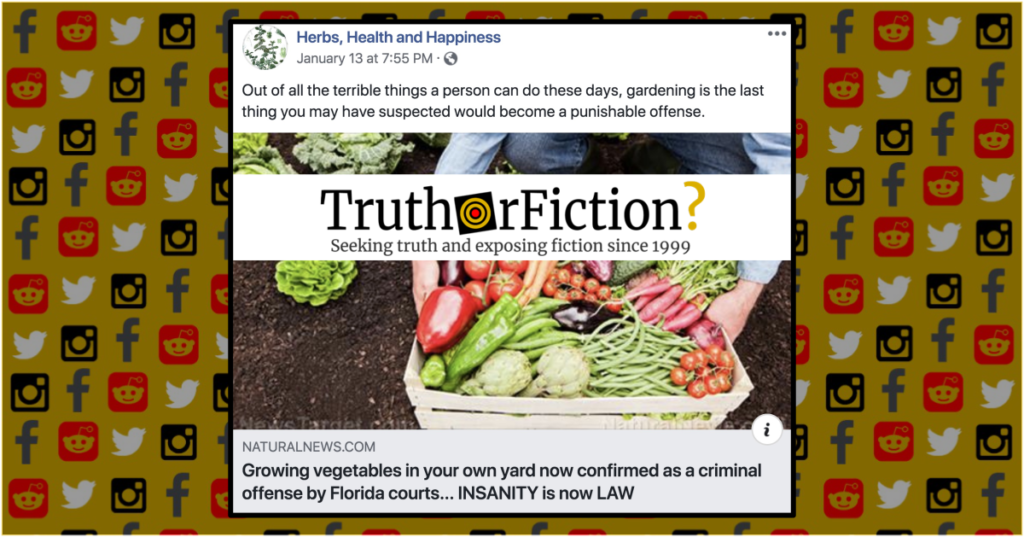In January 2019, the Facebook page “Herbs, Health, and Happiness” shared a Natural News item titled “Growing vegetables in your own yard now confirmed as a criminal offense by Florida courts … INSANITY is now LAW.”
The share racked up plenty of engagement, primarily among people chagrined that the government had outlawed gardening in one’s own yard. Clicking through to the article revealed an initial curious element — it was published in December 2017, and we were not immediately aware of anyone being hauled off to jail for their vegetable gardens.
The article claimed that the date of publication (which was December 13, 2017) was a “sad day in Florida,” adding that courts had ruled the growing of “edible plants” was “in fact, a crime”:
It’s a sad day in Florida: Property rights for homeowners have taken a huge blow as courts confirm that growing edible plants in your own front yard is, in fact, a crime. Out of all the terrible things a person can do these days, gardening is the last thing you may have suspected would become a punishable offense. To no one’s surprise, Big Government continues to use strong-arm tactics against innocent people looking to engage in some basic self-sufficiency. If they can’t take your guns, they’ll take your garden.
This display of obvious government overreach first began back in 2013, when Hermine Ricketts and her husband Tom Carroll were faced with fines of up to $50 per day — for the crime of growing edible plants like tomatoes and Asian cabbage in their front yard — after city ordinances were changed. While they didn’t face any jail time, the couple had to dig up their prosperous garden. Due to their north-facing backyard that gets little sun, they’ve not been able to resume gardening.
The piece continued:
According to the most recent ruling, Miami Shores has the right to brandish authority over design and landscaping criteria to maintain “property values and the enjoyment of property rights by minimizing and reducing conflicts among various land uses,” as well as for “protecting” the look of the village … Richard Sarafan, attorney for the Village of Miami Shores, essentially argued that allowing the couple to keep their front-yard garden would somehow pave the way for total pandemonium. Sarafan complained that the couple’s yard was “filled with pots” that “should have” been placed in the backyard. But yet, had those pots been filled with flowers instead of vegetables — the city would have had no legs to stand on with their arbitrary complaint.
Even the article’s own content hinted at the misleading nature of the headline and share, starting with the state of Florida (not the other 49 states in which gardens can also be grown) and narrowing it down not just to Miami, but to an upscale village called “Miami Shores.” News of the court case was in fact so old in January 2019 that we had to dig up an archived article published by the Miami Herald in August 2016 about the case.
According to local reporting, the dispute was over whether or not Miami Shores had the right to decide whether or not residents could grow vegetables in their front yard despite offending the neighbors’ aesthetic sensibilities. Local reporting noted that the judge in the case allowed that “Miami Shores still has every right to decide front-yard veggies make a neighborhood ugly,” continuing:
A Miami-Dade judge [in August 2016] upheld the village’s much-maligned ordinance banning the practice. In a 10-page ruling filled with legal analysis on the definition of vegetables, Circuit Judge Monica Gordo acknowledged she wasn’t quite sure how the gardens ruin the aesthetics of a neighborhood [but] she got to the root of the law: Miami Shores still has every right to decide front-yard veggies make a neighborhood ugly.
“Given the high degree of deference that must be given to a democratically elected governmental body … Miami Shores’ ban on vegetable gardens outside of the backyard passes constitutional scrutiny,” Gordo wrote.
The upscale village in Northeast Miami-Dade has long insisted it had every right to regulate the look of the community. At a hearing in June [2016], the village’s attorney said vegetable gardens are fine in Miami Shores, as long as they remain out of sight in the backyard.
“There is no vegetable ban in Miami Shores,” village attorney Richard Sarafan told the judge. “It’s a farce. A ruse.”
In the 2016 ruling, Gordo said that that complainants Hermine Ricketts and Tom Carroll had further recourse:
[Ricketts and Carroll] can petition the Village Council to change the ordinance. They can also support candidates for the Council who agree with their view that the ordinance should be repealed.
Gordo referenced code regulations in Miami Shores Village (Division 17, Sec. 536[e]) specific to landscaping regulation in the community, which stated:
Vegetable gardens are permitted in rear yards only.
Although Ricketts and Carroll lost a lawsuit over their desire to retain their front-yard vegetable garden in Miami Shores in 2016, the court’s ruling neither banned the growing of edible plants nor was applicable outside Miami Shores. In the unsuccessful suit, Gordo favored the existing code regulations in Miami Shores Village — which allowed vegetables to be grown in rear gardens, but not front yards. Even in the affected jurisdiction of Miami Shores Village, the couple and all residents were free to plant and grow vegetables and other edible plants anywhere except their front yards.

